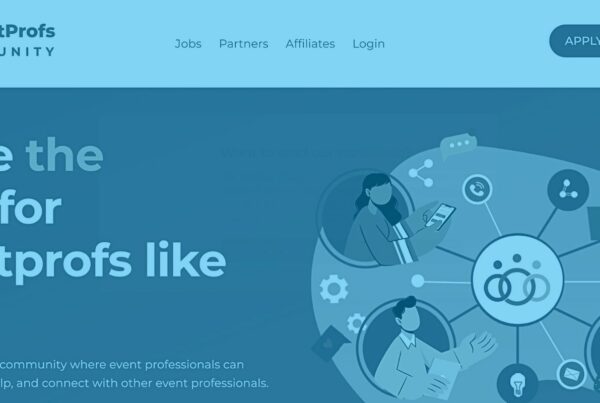Halloween is upon us, which means it’s time for the Event Tech Podcast to cover a truly spooky topic: scope creep. See, it even has the word ‘creep’ in it! So, what does it mean? When your project’s vision and goals change so much that they no longer fit the initial agreement, you’ve got yourself a pretty bad case of scope creep. Not only is it a living nightmare for all project managers, but it also negatively affects everybody else in the process: your team, your stakeholders, and your attendees.
In an industry in which constant changes and flexibility are the norm even if you’ve got the best event timeline and you know your event goals inside and out, scope creep is all the more dangerous. Brandt and Will have both experienced it, so they’ve decided to share their negative experiences with the listeners and come up with some solutions that help curb this fiendish phenomenon.
Defining Scope Creep In The Events Industry
The tech masters start the conversation about scope creep by defining what the term means to them. “You put in line, what you said you were going to do, and now someone’s asking you to go outside of that,” says Will. “Scope creep is when you start to get close to that or have barely exceeded it. Then, there’s also the worst-case scenario scope creep, which is ‘where is the scope anyways?'”.
“We would run into it all the time,” confirms Brandt. “When I worked for a production company, scope creep happened all the time. This is what you got hired to do and it includes these services. And then, the client says: ‘We have to do a happy face show at the end – is there any chance you could help us throw that together?’ And since it’s a $250 000 event, you say sure. But then, the client says that they could also use an opening video, and then some inspirational music, and then the conference logo comes in, and that’s the end. ‘Is that something you could do?’, and you say yes.”
“The crux of scope creep is this balance of trying to please the customer by taking on additional duties while still not letting things get out of hand. Not letting it feel like you’re being taken advantage of,” Brandt adds.
 Scope Creep: A Slippery Slope
Scope Creep: A Slippery Slope
Brandt shares how scope creep looked like in his recent experience, producing virtual events for small to medium-sized groups. “They can’t quite afford a full production company, but they know they need a little help. So they bring in basically one person (me), to try and help out. I got brought in on a show to be the technical producer for a digital event. It was for the purpose of picking my brain, asking what can they do to jazz up their agenda and make the event go well. In the course of doing that, I’d be asking questions. For example: ‘I see something here about playing back a video – who’s going to do that?’. And they say: ‘Oh, we hadn’t really thought about that.'”
And that’s when scope creep starts creeping in. “At some point, I said that I’ll take care of it. I got a gigabit internet service, I’m going to have a faster pipe than any of y’all. So in addition to managing presenters and tech checks, now I’m the video guy, the VMAX operator. I was taking on more and more responsibility in an effort to make the show better. And so by the end of it, I was octopus arms. Running all over the place, and they’re texting me about stuff and I’m trying to answer texts while playing back video while spotlighting people. But what I was theoretically brought in on was to help design the show, help guide them in forming their agenda, and working with presenters to make sure that they look and sound their best.”
“I’m sure I’m not the only person that’s out there that’s doing that,” says Brandt. “What can we do, not only as individuals but as organizations, to try and prevent scope creep? Because events people, we always want to please. We want it to be this amazing, great experience. But at some point, that scope creep bites you in the behind, because now you’re just too busy trying to do too much at the same time. And then things start to get dropped.”
Where Does It All Come From?
“The two areas in events that experience the most scope creep are event production and creative services,” says Will. “The cause of scope creep is that sometimes, clients are not exactly sure what the scope even is. We’ve talked a lot about this in our AV quotes walkthrough: you need to understand what’s on your proposal first before going in. They don’t really understand what the video engineer does. It’s similar with creative people. Event planners say: ‘Graphic design package sounds like something I need. Let’s go ahead and move forward with it’.”
Will comes up with a funny, yet telling metaphor. “It’s like if we were to go to McDonald’s, order a Big Mac, and then asking: ‘Can you do a medium-rare steak?’ That doesn’t happen because we clearly know what the bounds are in terms of what that person’s providing and what’s possible.”
“A big challenge of this is the desire to please,” he adds. “We all want to make sure our clients are happy. When it comes to events, we have to make last-minute decisions. We sit there and they say: ‘I don’t have anyone to edit that video. Can you just do it?’ If I say no, this is all going to go so wrong. So, we don’t really have a choice.”
 Client-Imposed VS. Self-Imposed Scope Creep
Client-Imposed VS. Self-Imposed Scope Creep
“It occurred to me as you were talking that we’re talking about two different types of scope creep. There’s scope creep being imposed on you by the client. And then there’s the self-imposed scope creep where you take this on because you want to make sure it gets done right,” says Brandt.
Client-Imposed Scope Creep: The Power Of Changelogs
He asks Will whether Endless has some internal processes in place that prevent scope creep from taking over the event planning process.
“When it comes to adjusting the scope, we make sure that everything we talk about is in writing. If you’re a client pleaser, you’re going to say yes to a lot of things. It can become problematic when you don’t even plan on charging extra for it. You’re just going to do it because you want to make sure the show goes well.”
“I remember doing some small AV gigs at the beginning when I’d just throw in an adapter for free,” he recalls. “But then eventually in your business, you’re going to want to charge for these things. You want to make sure that you’re properly compensated for that and they’re aware of it.”
“What I found really helpful is doing a changelog. At Endless, we have a log we use every single time something changes – no matter if it’s affecting the budget or not. Sometimes, clients change the scope in a positive direction where they don’t need something anymore. Sometimes, they do it in the negative direction where they’re adding things on. So, we want to keep logs of those changes. You can get in a dangerous spot where you’re reallocating the budget from something you didn’t end up doing, but the client’s not aware of how that change ended up happening. So then, they might ask for a discount, thinking they saved some money on not doing something.”
“A changelog is also helpful because the next year when you go to resell the project, you can show the updated proposal for next year,” he explains. “We digitized it and made it really easy for people to constantly update it. We make it so our program managers are constantly updating that scope change, even if the budget isn’t changing, just so that everybody’s on the same page.”
Don’t Make A Habit Out Of Self-Imposed Scope Creep
Moving on to the second type of scope creep: the self-imposed one, or as Brandt calls it, the insidious one. “You just start saying: ”ll take care of it’. And then suddenly, you’re putting extra demands on yourself, your crew, and your company, trying to do too many things at any given point in time. That way, you start to decrease the quality of the show instead of increasing it,” he says.”
Will agrees. “The hardest part is when you know that the show is not going to be as successful or it’s going to have major issues if you don’t do something. I think self-imposed scope creep is pretty healthy as long as you can justify it in the end. If it puts you in a place of stress or too much work, it allows you to then go back and argue why that needs to change in the future. The worst kind of self-imposed scope creep is when you commit to doing something and then you just keep doing it over and over again. The one-off scope creep is okay as long as it doesn’t become regular.”
What helps keep scope creep in control is tracking and experience. “But then you also need to be able to explain that,” says Brandt. “Tell your client that you’ve tried to do all of that in the past, but it’s just too much. We’ve tried to have the video switcher person also be the PowerPoint person and the teleprompter operator, but it really shouldn’t be done.”
So here’s how you can curb self-imposed scope creep: “Rather than saying ‘yes’ and then trying to figure it out within the current budget, take that moment and say: ‘We can do that, but it’s going to cost you extra. And here’s why’.”
“If you have the solution ready for them and you can tell them about the cost relatively soon, a lot of times they end up allowing you to add that on,” agrees Will.
 Conclusive Thoughts & Tips
Conclusive Thoughts & Tips
Before they sign off, Brandt makes one final comment about scope creep. “It’s actually harder and easier to have scope creep when it comes to virtual event platforms. We’re more used to the idea of online services having tiers. This is what it is included in this tier versus this is what’s included in that tier. If you try to go outside those bounds, they’re going to upgrade you to the next tier. There are these automatic bumpers when it comes to online software that we’re more used to, but for some reason when it comes to people, we don’t usually think that way,” he says.
Will shares his final advice about today’s topic. “Over-communicate the things that could go wrong, what you’re actually doing, what it might cost, even though you’re giving it to them for free, just over-communicate everything 100%. That can help a lot with making sure that scope creep doesn’t happen in the future or that people understand what’s going on with scope creep.”
“Your advice does make me think of another potential topic that maybe we can explore in another day, which is sometimes over-communicating is just over-communicating,” laughs Brandt. “So we might want to have a conversation about that at one point. I don’t need to be CC’d on every email from your association for the next three weeks.”
And that’s a wrap on today’s episode! Reach out to our hosts if you want to let them know your thoughts about scope creep. There’s no such thing as over-communicating when it comes to fan mail!










